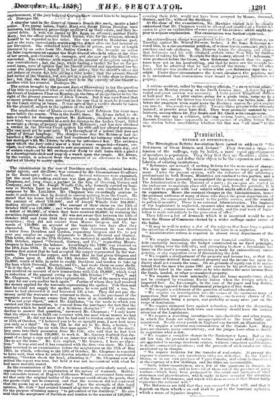TrEFORM AT 13T1OVINGNAM.
• 'The'Bhainghainl iAsaooiatitmr&vn leaned Mt -whiten* "the Reformean of Great Brittlittra144relarn).'-' They drunto4,n Limp: ex- tension suf the sultrage, vote hyalitt, .0 more equal aiVertiRincet of members to ponelation. They deny that they are tlieorttta ;' claim to be loyal siiI)jeets, and define their object to be the expansion and 012421i0
iidation of -existing:institutions. - • •
"Reformers are aecused" of seeking Reform for the more sake of °Lange. We deny the charge. We desire a change because we ?wantgood govern- went. tuder the present system, with the influence of the aristocracy predominant in both Houses, Ministries are confined to two parties, and a -few families have generally monopelized the govermueut o the country. The Administration is the Ministry of a party; its eueigies are wasted in the endeavour to maintain place and power aud'Irowever patriotic, it is rarely able to grapple With any subject which might afflict the interests of its supporters, thence the (mutant changes in the Administration, hence the personal unfitness of many of those who direct the great departments of the State, the consequent detriment to the public service and the scandal to political amorality. There is no national Administration. The business of the Legislature is neglected, measure after measure is introduced and abandoned; commissions issue without result, and the real work of legis- lation is made subordinate to the possession of ofilce."
Then follows a. list of demands 'which it is imagined would be met wore the House of Commons elected by a wider suffrage under cover of the ballet.
"It may he well to notice a file of the subjects that have long rcquired the attention of successive Governments, but have been neglected.
"Administrative reform is required in almost emery department of the State.
" We require immediate attention to our financial condition. With a debt constantly increasing, the budget constructed on no fixed prinoiple, merely tiding over the difficulty, and attempting to show a favourable lance on the year's account, no provision is made for extraordinary emer- gencies, or any suggestion even of diminishing the debt. "We require a readjustment of tin property and income tax, so that the tax on income derived from realized property and the income tax upon in- dustry shall not remain the same. On no grounds of equity can it be main- tainea that the man who gains 100/. per annum by his profession or trade should be taxed in the same ratio as he who derives the same income from the funds, landed, or other ace-unsulated property. "We require free trade internally; that the home manufacturer shall not be cramped by vexatious Excise duties when the foreign article is imported free. As, for example, in the case of the paper and hop duties, both of them opposed to the fundamental principles of free trade. " We require a settlement of the question of national educution. "We require au investigation into the causes of the enormous mass of pauperism _that now presses on the eountry,—one in every eleven of the adult population being a pauper, and probably as many more just on the verge of destitution. " We require stringent laws against seduction, and that the disgusting profligacy which disgraces both town and country should have the serious -attention of the Legislature. " We require • searching investigation into charitable and other trusts, in which the funds are either misappropriated or the trust badly ad- ministered. Nearly every perish in England can furnish an illustration. "We require a revision and consolidation of the Statute Law. Mans laws are obsolete malty contradictory, and the judges have often to decide. by majorities what is law. " We require a complete change in the Bankruptcy Laws. Bad as the old law was, the present ie111110il worse. Barristers and official assignees are appointed to manage insolvent estates, without competent qualifications to decide commercial questions; and the proceeds of such estates are often swallowed up in ohargee. " We require facilities for the transfer of real estate. At present the expense is enormous, and numberless titles ate defective. In the United States, or in our own province of Upper Canada, real estate is transferral at the expense of a few shillings, and the titles are ineontestible. " Such, fellow-eountrymeu, arc a few of the questions in finance, in commerce, in morale, and in law—all of them out of the province of party warfare—which have been postponed to the (abide and intrigues of rival statesmen and place-hunter:I, which ought to Mire occupied the attention of the House of CO11101010, and which will dos* as tonal as that House fairly represents the national will." The Reformers are told that they can succeed if they will, and that it depends on them wlietli-r an end shall be put to the constant agitation which a sense of injustice inspires.


























 Previous page
Previous page